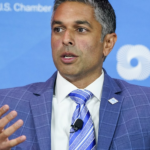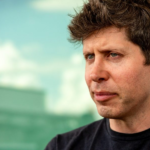And so, as the Trump administration unveiled its highly anticipated AI policy plan on Wednesday, it seemed only fitting that the ceremonies and celebrations took the form of a live podcast in the nation’s capital.
Sitting on plush white chairs and backed by American flags, patriotic music, and flashy videos of giant data centers and factories, the event’s hosts (the podcast’s self-described “besties”) and guests discussed the AI arms race with China, supply-chain risks, health care, education, and “giving the American workers superpowers.”
Artificial intelligence is “not destroying jobs,” said David Friedberg, one of the podcast hosts and a venture capitalist. The media, he said, has created a false narrative that ignores the “immense job creation underway.”
As Vice President Vance came onstage, the audience of several hundred people rose to its feet and cheered. “We have the best hardware and software, but our edge is not something we can rest on our laurels,” Vance said. “If we regulate ourselves to death we should blame our own leaders.”
The U.S. must win the AI arms race, said Sacks as the event kicked off. “The consequences of losing the race are unthinkable.”
Sacks said the AI report had three big pillars: accelerating innovation; building U.S. AI infrastructure; and leading in international diplomacy and security.
Wednesday’s event, at Washington D.C.’s neoclassical Andrew Mellon Auditorium, where President Franklin D. Roosevelt announced military conscription in 1940 and the North Atlantic Treaty was signed nine years later, made for a sometimes surreal display of the Trump administration’s fusion of politics, policy, and entertainment. And it underscored the extent to which Silicon Valley’s leaders are keen to foster good relations with the Trump administration. Other guest speakers at the event included Paul Buchheit, the creator of Gmail, James Litinsky, the CEO of rare earth minerals company MP Materials, and AMD CEO Lisa Su.
“We are seeing this incredibly large demand in AI,” said Su, stressing the company’s commitment to produce some chips in Arizona through a facility built by TSMC.
“Today’s AI Action Plan is an excellent blueprint,” said Su.









